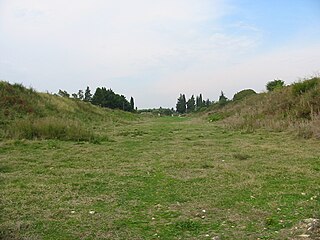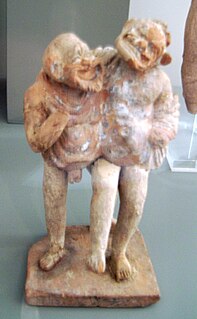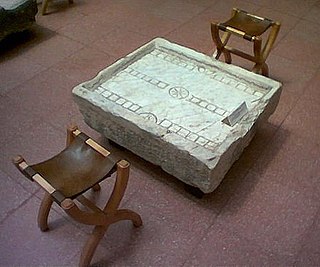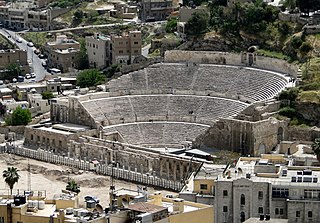 W
WIn Ancient Roman religious tradition, Actia was a festival of Apollo, celebrated at Nicopolis in Epirus, with wrestling, musical contests, horse racing, and sea battles. It was reestablished by Augustus, in commemoration of his victory over Mark Antony off Actium in 31 BC; that it was probably the revival of an ancient festival is suggested by the celebrated temple of Apollo at Actium, which is mentioned by Thucydides, and Strabo, and which was enlarged by Augustus. The games instituted by Augustus were celebrated every five years ; they received the title of a sacred agon and were also called Olympia.
 W
WFabula palliata is a genre of Roman drama that consists largely of Romanized versions of Greek plays. Palliata comes from pallium, the Latin word for a Greek-style cloak. It is possible that the term fabula palliata indicates that the actors who performed wore such cloaks. Another possibility is that the fabula itself is metaphorically "cloaked" in a Greek style. As in all Roman drama, the actors wore masks that easily identified which of the stock characters they represented.
 W
WThe inaugural games were held, on the orders of the Roman Emperor Titus, to celebrate the completion in AD 80 of the Colosseum, then known as the Flavian Amphitheatre. Vespasian began construction of the amphitheatre around AD 70 and it was completed by his son Titus who became emperor following Vespasian's death in AD 79. Titus' reign began with months of disasters – including the eruption of Mount Vesuvius, a fire in Rome, and an outbreak of plague – he inaugurated the completion of the structure with lavish games that lasted for more than one hundred days, perhaps in an attempt to appease the Roman public and the gods.
 W
WLudus duodecim scriptorum, or XII scripta, was a board game popular during the time of the Roman Empire. The name translates as "game of twelve markings", probably referring to the three rows of 12 markings each found on most surviving boards. The game tabula is thought to be a descendant of this game, and both are similar to modern backgammon.
 W
WLudus latrunculorum, latrunculi, or simply latrones was a two-player strategy board game played throughout the Roman Empire. It is said to resemble chess or draughts, but is generally accepted to be a game of military tactics. Because of the scarcity of sources, reconstruction of the game's rules and basic structure is difficult, and therefore there are multiple interpretations of the available evidence.
 W
WRecitationes were a literary practice of ancient Rome that involved one or more public readings of a text. Some of these occurred in public places, and even in the Roman Forum.
 W
WRoman theatres derive from and are part of the overall evolution of earlier Greek theatres. Indeed, much of the architectural influence on the Romans came from the Greeks, and theatre structural design was no different from other buildings. However, Roman theatres have specific differences, such as generally being built upon their own foundations instead of earthen works or a hillside and being completely enclosed on all sides.
 W
WThe architectural form of theatre in Rome has been linked to later, more well-known examples from the 1st century B.C.E. to the 3rd Century C.E. The Theatre of ancient Rome referred to as a period of time in which theatrical practice and performance took place in Rome has been linked back even further to the 4th century B.C.E., following the state’s transition from monarchy to republic. Theatre during this era is generally separated into genres of tragedy and comedy, which are represented by a particular style of architecture and stage play, and conveyed to an audience purely as a form of entertainment and control. When it came to the audience, Romans favored entertainment and performance over tragedy and drama, displaying a more modern form of theatre that is still used in contemporary times. 'Spectacle' became an essential part of an everyday Romans expectations when it came to Theatre. Some works by Plautus, Terence, and Seneca the Younger that survive to this day, highlight the different aspects of Roman society and culture at the time, including advancements in Roman literature and theatre.Theatre during this period of time would come to represent an important aspect of Roman society during the republican and imperial periods of Rome.